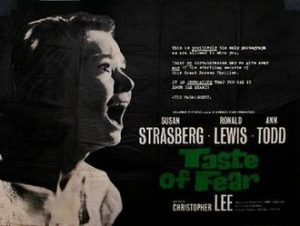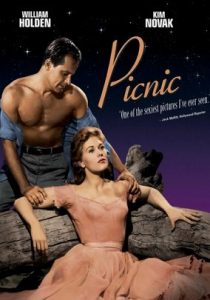Taste of Fear-1961
Director Seth Holt
Starring Susan Strasberg, Ronald Lewis
Scott’s Review #901

Reviewed May 21, 2019
Grade: A-
Though Taste of Fear (1961) is a Hammer Production, a British film company known for its heavy horror offerings, it plays more like an intense and chilling thriller with a Gothic, ghostly feel than a full-throttled horror display.
The title was changed for US marketing purposes to Scream of Fear, and neither the US nor the UK title quite works, lacking the appropriate pizzazz that the film warrants.
The result is a razor-edged spellbinder with marvelous cinematography and more than a few surprise twists.
The action gets off to an exciting start as a female body is suddenly discovered in the waters of coastal Italy; a young woman has taken her own life by drowning.
Soon after, a heiress who uses a wheelchair, Penny Appleby (Susan Strasberg), arrives at her father’s estate in the lavish French Riviera to bond with her new stepmother, Jane (Ann Todd), and await her father’s return from vacation.
It is explained that the deceased woman was a close friend of Penny’s.
Penny distrusts her stepmother immensely but is unsure why since the woman is more than accommodating during her stay.
Immediately, strange events begin to occur at a rapid rate, most notably seeing her father’s corpse in odd places around the house and the grounds. The body disappears when Penny calls for help, leaving the household members questioning her sanity and Penny starting to agree.
She befriends the handsome family chauffeur, Robert (Ronald Lewis), and the pair are determined to figure out what is happening.
Cleverly, the audience knows something is amiss but not what the entire puzzle will add to, which is an excellent part of the viewing pleasure. Director Seth Holt enjoys toying with his viewers, keeping them guessing at every dark turn.
The biggest questions are these: If Penny’s father is dead, where is the body being hidden? Who is responsible and why? Why does Jane leave the house for drives every night? What does the family doctor (Christopher Lee) do with the story?
The best visual aspect of Taste of Fear is the black-and-white cinematography, which adds foreboding and brooding elements throughout the film’s short running time of eighty minutes.
The grand estate with creepy nooks and crannies provides plenty of prop potential. A grand piano that seems to play by itself is pivotal to the story, as is a murky pool, shockingly deep and unkempt for such a residence. Finally, the mansion boathouse that may or may not contain lit candles takes center stage during the film.
The storytelling is quick-paced and robust, never dragging. Layers unfold as the story progresses, but the developments are necessary instead of overkill as the conclusion comes into view.
Assumptions about which character’s motivations are devious begin to unravel. The illustrious dialogue crackles with spunk, and by the time we figure out what is going on, we scratch our heads in disbelief, finally surrendering to the film’s manipulations.
Taste of Fear falters slightly when an attempt to make the story ultimately add up is pondered. Liberties must be taken happily so, as what could be deemed silly or superfluous instead results in thrilling fun.
Once or twice, I thought the setup was too contrived, but I just as quickly tabled the inquisition instead of choosing to revel in the story.
The more than adequate cast performs their roles with professionalism and energy, always careful to make the unbelievable believable. Any film starring the legendary Christopher Lee is worthy of praise, even if the actor only has a supporting role.
Justice is eventually served, though, as his character becomes central to the plot.
A fun fact is that Lee said, “Taste of Fear was the best film I was in that Hammer ever made. It had the best director, the best cast, and the best story.” Given the actor’s catalog of treasures, this is not to be easily dismissed.
A forgotten delight, Taste of Fear (1961), is a prime example of a film that does everything correctly.
It is an excellent story, Gothic gloominess, and a foray for Hammer Production company into the new psychological thriller genre. The piece is never over-the-top and is a production sure to impress Hitchcock himself.

